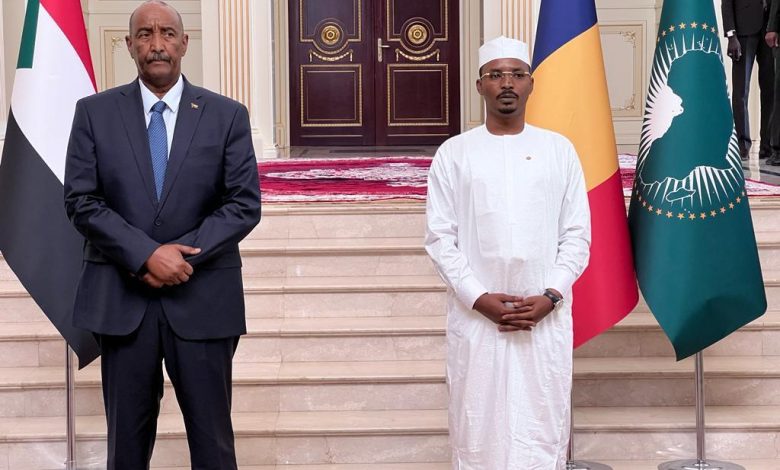Reports
Chad: A Source of Mercenaries for Militia – What Kind of Neighbor Does It Want to Be to Sudan?

Sudan Events – Agencies
The Sudanese war has cast a shadow over Sudan’s foreign relations in general, but its impact has been more pronounced on its relations with neighboring countries, especially the western neighbor, Chad. The involvement of Chad in hostile actions against Sudan is no longer a matter of debate.
What is particularly surprising is the denial by Chad’s Foreign Minister, Abdel Rahman Glamhallah, in an interview with France 24 last week, where he shamelessly denied his country’s support for the rebellious Rapid Support Forces (RSF), despite all evidence pointing to Chad being the main supporter and source of mercenaries for the Janjaweed militias. These militias are based in various regions in Chad, including: Shari Bagermi Province, where the capital N’Djamena is located; Am Timan Province, on the border with Sudan and the Central African Republic; the Andi area in northern Chad; Ati, Beltin, and Wadi Abshi; Wadi Sira and its capital, Garsila, on the border with Sudan; the Kanem region on the border with Niger; and the artisanal mining areas in northern Chad, bordering Libya (Kouri Boudou, Meski, Area 35, Mine 13), and the central region of Kira, and the Salamat region in eastern Chad.
Reports from the United Nations Panel of Experts on the Arms Flow to Darfur indicate that Chadian fighters, particularly those displaced from Libya and involved in the war supporting retired General Khalifa Haftar, especially the Jufra groups trained by the Russian Wagner group and the “Triangle” group based at the Libyan-Sudanese-Chadian border, represent the largest mercenary presence in the region.
Chadians are a key component in the RSF’s military operations due to several factors: shared tribal affiliations, cultural similarities with western Sudan, ease of movement across the border, and the presence of social shelters. Alexander Bich, an assistant professor in the Department of Security and Crime Science at London College, predicted in a May 2023 article that the Sudanese war could present an opportunity for Chadian armed groups to exploit the conflict for their economic gain through participation in the war economy.
Bich based his prediction on the 2020 agreement in Libya, which reduced opportunities for mercenaries there, while their presence in Libya itself was threatened by calls for the withdrawal of all foreign fighters. Numerous social media clips have surfaced showing Chadian fighters allegedly participating in the Sudanese war.
In April 2024, the Sudanese Army announced the capture of “mercenaries” from Chad and South Sudan, fighting with the RSF in Omdurman, west of Khartoum. The army also accused Chad of facilitating the entry of fighters into Sudan, a claim that was vehemently denied by N’Djamena.
To prevent the Chadian Foreign Minister from further denying his country’s involvement in supporting the RSF, experts on Chadian affairs, speaking to Al-Muhqaq news site, confirmed that Chadian President Mahamat Idriss Déby had told the UAE Minister of State for Foreign Affairs, Sheikh Shakhbout, during his recent visit to N’Djamena, that Chad had opened its air, land, and sea space to both Emirati and Western intelligence agencies to target the Sudanese Army. However, the RSF’s actions foiled these plans as they became enemies of the people, not just the Sudanese army.
Experts revealed that Deby’s son explained to the Emirati guest that if the RSF had withdrawn from the city of Al-Fasher after the United Nations Security Council’s decision and ceased attacking the city, an agreement could have been reached with the Zaghawa people to keep Al-Fasher in the agreement. However, the RSF’s actions against civilians and burning of villages, including those of the Zaghawa, was a major mistake, as their actions had become tribal and sectarian, making their tribal identity more important than the state.
Sources added that Sheikh Shakhbout had asked Chad to rectify all mistakes and acknowledged that the alliance between the armed movements in Darfur and the Sudanese army had contributed to the failure of their plan to occupy Al-Fasher. The UAE minister pledged to provide military support, including all types of weapons and equipment, under the guise of counterterrorism efforts, as well as a direct cash assistance of $500 million to support parliamentary elections and help the families of Chadian soldiers who died in Lake Chad.
According to the experts who spoke to Al-Muhqaq, an internal conflict in Chad’s leadership is escalating about whether it is in the country’s interest to continue opening its doors to execute the UAE’s agenda, which harms Sudanese-Chadian historical relations, or whether it is better to de-escalate the situation and contain the crisis amicably to maintain normal relations. Which side will prevail?
Source: Al-Muhqaq News Site



